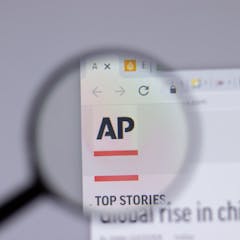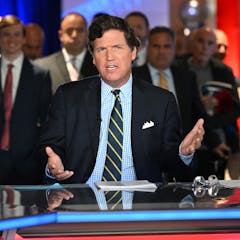
Articles on US journalism
Displaying 1 - 20 of 46 articles

At the turn of the 20th century, Southern sympathizers started building monuments to Confederate leaders. Black newspaper editors saw these emblems clearly for what they stood for – a lost cause.

During Cooper’s long tenure as a senior executive, general manager and executive director, he changed the Associated Press and the news its readers and listeners depended on, in major ways.

Tucker Carlson and his employer, Fox News, had an incredible understanding of what their audience wants: a kind of authenticity that is not genuine but instead manipulative.

A scholar of Russia’s legal code explains the case against the Wall Street Journal reporter accused of espionage.

Where regular reporters have disappeared, university-led statehouse reporting programs have stepped in.

Many images from the Ukraine war are compelling and distressing depictions of the human costs of war.

Partnerships between universities and local media outlets are key ways to sustain local news where coverage is diminishing.

In trying to present violent events in ‘neutral’ language, media reports may be ignoring power imbalances when it comes to Israeli police or military violence against Palestinian civilians.

A series of in-depth interviews with self-described conservatives found concerns that go beyond concerns about selective facts or obvious partisanship.

When news outlets also publish so-called ‘native advertising,’ their journalistic reputations suffer – and their news coverage shies away from the companies that paid for the ads.

An article that used geolocation data to place a priest at gay bars raises questions over journalistic ethics, and shines a light on the Catholic media landscape.

The daily deluge of information produced by the news media can drown consumers in confusion and anxiety, but there are steps you can take to filter out the noise and remain enlightened.

In the aftermath of Adam Toledo’s death, police and a prosecutor framed the incident as a confrontation with an armed male holding a gun. Should reporters have been so quick to accept that version?

A new era will require a new approach when it comes to reporting US politics.

There’s a lot of scholarship, but a likely reason is pretty basic: People simply don’t trust what they’re reading and hearing.

Americans truly value local news. But 71% think that their local news outlets are doing just fine financially – which might explain why only 14% paid for a local news source in the past year.

Julian Assange’s indictment under the Espionage Act, a sweeping law with heavy penalties for unauthorized receiving or disclosing of classified information, poses a threat to press freedom.

The president’s blame-the-press rhetoric is, to the news media, calculated to score political points. But are there real problems US journalists need to address in their work? Yes, says one scholar.

It’s dangerous for the press to take up Julian Assange’s cause, two journalism scholars write. Assange is no journalist, they say, and making him out to be one is likely to damage press freedoms.

A recent survey found that Americans trust local media outlets far more than national ones.





